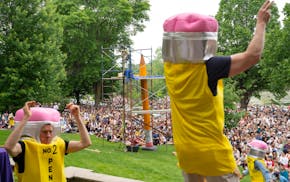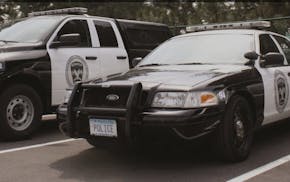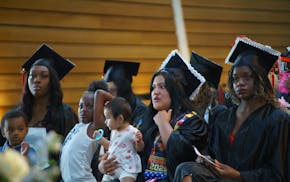At the Minnesota State Fair, we're all in it together — whether waiting for Pronto Pups, midway rides or the hottest new food items. We also line up together to get there — on buses, trains bikes and automobiles.
Longtime fairgoers have their preferred ways of commuting — a secret parking spot, a little-known express bus, a Falcon Heights friend's driveway. So which form of State Fair transit is actually the fastest? We sent four reporters out in search of answers.
Starting Line
Our team took off on Friday morning from the Minnesota Star Tribune office in downtown Minneapolis. Last year, the first Friday of the fair set attendance records.
Public transit
I sprinted to the Green Line light rail at Government Plaza, barely catching the train leaving at 9:46 a.m.
As I sat in the mostly empty train — listening to the music playing from one passenger's phone — I felt confident that public transportation could get me there first because it avoids the chaos of finding parking.
I rode the train for about 30 minutes before getting off at Snelling Avenue to transfer to the A Line bus.
The bus was standing room only and packed with fairgoers. As we approached the fair entrance, traffic came to a near-standstill because of a crash.
I got off the bus around 10:20. It took about 10 minutes to get through the line for prepaid tickets and get my bag checked by security.
I was a tiny bit disappointed a colleague who rode a park-and-ride bus beat me by about two minutes, but it was a painless way to get to the fair.
The slowdown
The biggest delay was the crash on Snelling Avenue. The only other slowdown was waiting for the Snelling light to turn red so we could cross the street. — Louis Krauss
Park and ride
I sprinted to my parked car and hopped on the highway headed toward the University of Minnesota park-and-ride. It was a quick drive to the lot at Huntington Bank Stadium. One lot was already full before 10 a.m. , so I kept driving around the stadium until I found an emptier lot. Pro tip: Even though it was a little farther away, an emptier lot meant a shorter line to get on the bus.
The next bus was standing room only, but the ride was short and free. My seatmate and I chatted about what foods we would try when we got in.
The slowdown
It took longer to get through security than onto a bus. Once I made it inside the fairgrounds, I jogged over to the Star Tribune booth, where I was dismayed to find that I was beaten by bicycle. But I was happy with second place and felt that park-and-ride was a smooth way to travel to the fair. — Zoë Jackson
Bike
I had taken my bike on a test run a couple of times. I get a little competitive, so I mapped out the route to tweak for maximum efficiency.
We set out at 9:44 a.m. Google Maps directed me northeast on 3rd Avenue S., then southeast on S. 2nd Street until I hit 13th Avenue S.
From there it was a matter of hopping on the University of Minnesota bikeway on Bluff Street and winding through campus until I hit the U's transit way. The route was straightforward: a direct line from Dinkytown to Falcon Heights with the occasional curve.
I was riding a single-speed bike, and by the time I had biked the better part of 3 miles, buses and maintenance vehicles roared past. But then the Lee and Rose Warner Coliseum came into view and the scent of manure grew from faint to pungent.
At this point, anything felt possible and the ground began to slope down as I zoomed past the buses that overtook me on the transitway. I arrived at the bike barn on Como Avenue at 10:09 a.m. and made it to the Strib booth nine minutes later.
The slowdown
I could have made it to the fair sooner if I had an e-bike or a 10-speed. A low gear would have helped me climb the last big hill. I also spent a good five minutes getting through the metal detector because the magnet in my glasses case kept setting off the alarm.— Eder Campuzano
Car
All roads lead to the Minnesota State Fair, and if you're smarter than me, you won't drive on any of them.
I was the driving leg of the Minnesota Star Tribune's race to the fair and I came in last. By a lot.
Never has a loss been more predictable or deserved.
On the upside, all the gridlock gives you plenty of time to admire the entrepreneurial spirit of St. Paul as you inch past the parking signs in every yard and lot you pass. $35 parking (full). $30 parking (full up). $20 (ha ha ha no). Absolutely No Parking (also somehow full).
As I edged down Snelling, there was a blazing moment of irrational optimism that I might actually luck into some on-street parking. Morning drizzle meant traffic wasn't even backed up to the interstate the way it would be on sunnier days.
The slowdown
Within a block, drivers were honking and flipping each other off, because finding parking within a 1-mile radius of the fairgrounds is about as much fun as a root canal. Except it takes longer.
I staggered onto the fairgrounds long after Team Bicycle breezed up to the gates. I eventually lucked into on-street parking, in some remote corner of Como Park that I am definitely never going to be able to find when it's time to go home.
Don't be like me, gentle fairgoers. Take the bus. Hop on a bike. Park and ride. Walk from the Wisconsin border. You can thank me later. — Jennifer Brooks
And the winner is?
Bicycle! Biking to the fair from downtown Minneapolis took 25 minutes. Public transit and park-and-ride were neck and neck at about 33 minutes. Traveling by car came in last, at more than an hour.
As Eder put it, it's the mode of transit that means you can eat whatever you want. Driving was not only the slowest and most frustrating, but also the most expensive.
However you decide to get to the fair, be patient. And thank your bus or transit driver!
More Canadian wildfire smoke moving into Minnesota on Sunday

What's the point? It's the annual sharpening of the giant pencil on Lake of the Isles

Four arrested, no one injured in fighting and shooting following Burnsville High School graduation

